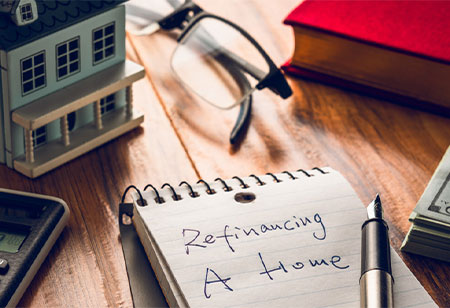
If you're considering refinancing your mortgage but are not quite sure if it's the right move, you've come to the right place! Refinancing can be a smart financial decision with numerous benefits, but it’s important to understand how it works and what you can gain from it.
Let's dive into the various benefits of refinancing your mortgage in a friendly and easy-to-understand way.
What is Mortgage Refinancing?
First off, let’s get clear on what mortgage refinancing actually is. When you refinance your mortgage, you’re essentially taking out a new loan to replace your existing one. This new loan pays off your old mortgage, and you start making payments on the new loan.
The goal is to secure better terms that align more closely with your current financial situation and future goals. You can click here to learn more about this process.
Lower Interest Rates
 The first great thing about refinancing is the potential to secure a lower interest rate. Interest rates fluctuate over time, and if they have dropped since you first took out your mortgage, refinancing can lock in these lower rates. Even a small reduction in the interest rate can save you a considerable amount of money over the life of the loan.
The first great thing about refinancing is the potential to secure a lower interest rate. Interest rates fluctuate over time, and if they have dropped since you first took out your mortgage, refinancing can lock in these lower rates. Even a small reduction in the interest rate can save you a considerable amount of money over the life of the loan.
Imagine you took out your mortgage a few years ago when interest rates were higher. If rates have since dropped by even 1%, refinancing could reduce your monthly payments and save you thousands of dollars in interest payments over the years. It’s like giving your wallet a nice little bonus every month.
Lower Monthly Payments
Refinancing can also help lower your monthly mortgage payments. By securing a lower interest rate or extending the loan term, you can reduce the amount you need to pay each month. This can free up cash for other expenses or financial goals.
For example, if you’re currently paying $1,500 a month on your mortgage and refinancing lowers it to $1,200, that’s an extra $300 each month you can put towards savings, investments, or simply enjoying life a bit more. It’s about making your financial life a little easier and more flexible. Check out this link for more https://qz.com/mortgage-refinancing-myths-rates-loans-credit-1851529449/slides/2.
Shorten the Loan Term
 Another great benefit of refinancing is the opportunity to shorten your loan term. If you’re in a better financial position now than when you first took out your mortgage, you might consider refinancing to a shorter term, such as moving from a 30-year to a 15-year mortgage.
Another great benefit of refinancing is the opportunity to shorten your loan term. If you’re in a better financial position now than when you first took out your mortgage, you might consider refinancing to a shorter term, such as moving from a 30-year to a 15-year mortgage.
Shortening the term of your loan means you’ll pay off your mortgage faster and save a substantial amount on interest over the life of the loan. While your monthly payments might be higher, the overall savings can be significant. Plus, imagine the peace of mind that comes with being mortgage-free sooner!
Switch to a Fixed-Rate Mortgage
If you currently have an adjustable-rate mortgage (ARM), refinancing gives you the chance to switch to a fixed-rate mortgage. ARMs can be attractive initially due to their lower introductory rates, but they come with the uncertainty of rate adjustments over time, which can lead to higher payments.
Switching to a fixed-rate mortgage locks in your interest rate for the entire loan term, providing stability and predictability in your monthly payments. You won’t have to worry about market fluctuations affecting your mortgage payments, giving you one less thing to stress about.
Tap Into Home Equity
Refinancing can also be a way to tap into the equity you’ve built up in your home. This is often done through a cash-out refinance, where you refinance for more than you owe on your current mortgage and take the difference in cash. This can be a useful way to access funds for major expenses like home improvements, education, or paying off high-interest debt.
For instance, if your home has significantly appreciated in value, a cash-out refinance can provide the funds you need for a kitchen remodel, paying off credit card debt, or even investing in a new business venture. It’s like unlocking the financial potential of your home.
Consolidate Debt
Speaking of debt, another benefit of refinancing is the ability to consolidate high-interest debt. By using the equity in your home to pay off credit cards, personal loans, or other debts with higher interest rates, you can simplify your finances and save money on interest.
For example, if you have several credit cards with interest rates above 15%, consolidating this debt into your mortgage at a lower interest rate can reduce your overall interest payments and make managing your debt more straightforward.
Remove Private Mortgage Insurance (PMI)
If you purchased your home with less than 20% down, you’re likely paying private mortgage insurance (PMI). Refinancing can help you eliminate PMI if your home’s value has increased and you now have more than 20% equity.
By refinancing to remove PMI, you can lower your monthly payments and save money. It’s a great way to take advantage of your home’s increased value and reduce unnecessary expenses.
Improve Loan Features
Refinancing gives you the opportunity to improve various features of your loan that may no longer suit your needs. This can include adjusting the loan term, changing the type of interest rate, or removing someone from the mortgage if your life circumstances have changed, such as a divorce.
For example, if you initially opted for a mortgage with a longer term to keep payments low but are now in a better financial position, refinancing to a shorter term can help you pay off your loan faster and save on interest.
Better Financial Management
Refinancing can be a strategic move to better align your mortgage with your current financial goals and situation. Whether you want to lower your payments to free up cash flow, shorten your loan term to become debt-free faster, or access equity for major expenses, refinancing offers flexibility to tailor your mortgage to your needs.
It’s about taking control of your finances and making decisions that benefit your long-term financial health. By refinancing, you can create a more manageable and sustainable financial plan that supports your lifestyle and goals.
Potential Tax Benefits
While the tax laws have changed in recent years, there are still potential tax benefits to refinancing. For instance, the interest on a mortgage for a primary residence is often tax-deductible, which can reduce your taxable income. However, it's essential to consult with a tax professional to understand how refinancing might impact your specific tax situation.
Taking advantage of these potential tax benefits can further enhance the financial advantages of refinancing, making it an even more attractive option.
What Else to Know?
Before deciding to refinance your mortgage, it’s important to consider several additional factors to ensure it’s the right move for your financial situation:
Closing Costs and Fees
Refinancing a mortgage comes with various closing costs and fees, such as appraisal fees, origination fees, and title insurance. These costs can add up to 2-5% of the loan amount. It’s crucial to calculate whether the savings from a lower interest rate will outweigh these upfront costs. Sometimes, lenders offer “no-cost” refinancing, where closing costs are rolled into the loan amount or the interest rate is slightly higher to cover these fees.
Break-Even Point
The break-even point is the time it takes for the savings from the lower monthly payments to cover the closing costs of the refinance. To find the break-even point, divide the total closing costs by the monthly savings. If you plan to stay in your home beyond this break-even point, refinancing is likely a good financial move. For example, if the closing costs are $3,000 and you save $200 per month, the break-even point would be 15 months.
Current Equity in Your Home
The amount of equity you have in your home can affect your ability to refinance and the terms you receive. Lenders typically prefer borrowers with at least 20% equity in their homes. If you have less equity, you may still be able to refinance, but you might face higher interest rates or be required to pay private mortgage insurance (PMI).
Long-Term Financial Goals
Consider how refinancing aligns with your long-term financial goals. If your goal is to pay off your mortgage quickly, refinancing to a shorter term with higher monthly payments might be the right choice. If you need more cash flow for other investments or expenses, lowering your monthly payments with a longer term could be beneficial. Make sure refinancing supports your overall financial strategy.
We use cookies to ensure you get the best experience on our website. Read more...